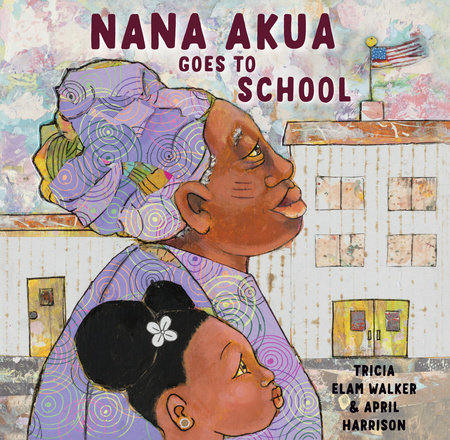Nana Akua Goes to School
 Nana Akua Goes to School
Nana Akua Goes to School
Picture Book / Ages 3-7
Schwartz & Wade
2020
40

Zura is worried about how her classmates will react to her Ghanaian Nana's facial marks on Grandparents Day, but Nana finds a way to show how special and meaningful they are.
Nana Akua Goes to School by Tricia Elam Walker & April Harrison is a splendid book! It begins with Zura being anxious about the upcoming “Grandparents Day” at her school because her Grandmother has unique face markings that she received as a child growing up in Ghana, West Africa. The markings on her face are an old tradition that showed which ethnic group a person belonged to and represented beauty and confidence. In the past, children have made jokes and comments in front of Zura about her grandmother’s face. She is worried the children in her class will be mean to her. But Grandma Nana Akua is confident and brave. She makes a plan to teach the children about tradition and culture in Ghana in a way that helps Zura feel good and proud. It ultimately makes the whole class think more about their own identities.
This is a story where the reader will learn much more than some facts about Ghanaian culture. Students will enjoy reading about the other children in Zura’s class and their grandparents from other cultures and backgrounds. The illustrations are detailed and beautiful. The diversity in Zura’s class is well represented in the images, the children’s names and their “abuelas” and “mimis.” The inclusion of the West African Adinkra symbols in the story and the book liner is done well. They are listed by their Akan name (a language and people from Ghana and Cote d’Ivoire) with a pronunciation guide, definition and illustration.
It is important to note that the story uses the word “tribe.” This word is often inaccurate and conveys myths and stereotypes about Africans even though it is often used by many African people when speaking English. Here is a good resources for understanding this complexity: The Trouble with Tribe
Discussion questions for families and classrooms:
- What is something special about your grandparent or a special elder you know?
- Which Adinkra symbol would you pick?
- Have you ever heard a kid make fun of someone you care about? How did that make you feel? What did you do about it?
- Can you think of something that is common in your family (or culture) but might not be in another family or culture?
- What does the saying “All bodies are good bodies” mean? (Also “all hair is good hair” or “all skin is good skin”).
- It is ok to be curious about the differences in people, but how can we learn more about others without passing judgement or assumptions?
- What do we gain by having guest speakers and guests in the classroom? How is learning directly from a person different than reading a book?
Highly Recommended
Reviewed by Anastasia Shown, MSW, Lecturer, University of Pennsylvania School of Social Policy and Practice
Published in Africa Access Review (September 4, 2020)
Copyright 2020 Africa Access

See Interview with author Tricia Elam Walker sponsored by D.C. Public Library and InkPen https://www.youtube.com/watch?v=w9M4fHLLQlY